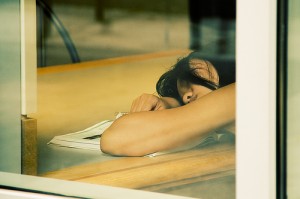Some upperclassmen reassure MVHS novices that putting your back into the enormous workload pays off in the end, when the big picture is in view. But with each new class of students, the standard for academic pressure just gets higher, and bedtime is pushed back later and later. The usual tendency in the sleep deprivation pattern is for students to to blame the school for their procrastination in regards to assignments, when some simple readjustments in prioritization can improve their entire schedule.
During the last few weeks of school, as finals approach, the bags underneath the eyes become prominent and coffee becomes a regularly drank beverage. MVHS brings out the competitive streak in most students, pushing them until they have the motivation to accomplish goals they had filed under “unreachable.” Students tend to accuse MVHS of blurring the fine line between stamina-building mental exercise and unhealthy overexertion. But it’s perfectly possible to stay in the realm of hearty mental exercise if students focus and use effective effort, without the distraction of chatting and texting.

Help Guide states that it is most beneficial for teens from the age of 13 to 18 to sleep between 9 p.m. and 11 p.m. because resting during this window of time increases the overall quality of sleep while also ensuring there is an appropriate quantity of sleep. According to the Center for Advancing Health, research from 2010 shows that only 8 percent of high school students get an appropriate amount of sleep on regular school days, meaning that this number doesn’t even take into account days before exams, major projects or competitions. There has never been an official amount of hours of sleep that adolescents should receive— some scientists believe as little as seven hours is acceptable while others are confident that high schoolers require a minimum of 10 hours.
Whatever the number may be, students who don’t get enough sleep as everyone else are considered by their peers as diligent, smart students, making a lack of sleep a symbol of excellence. The lack of sleep that students receive is not only detrimental to their health, but it has become into a ridiculous, sensationalized competition, where the less a student sleeps, the more dedicated of a learner they are.
While several students who have piled up on the extracurriculars and APs do have to spend hours at a time studying, reviewing and practicing, the fact is that many students are simply distracted by social media sites in an effort to remain connected with friends. Students are attempting to make their lack of sleep a positive factor, but reading a paragraph of a book from Literature/English class every half an hour while watching a movie at 1 a.m. is not studying or a beneficial habit to have.
According to Psychology Today, 56 percent of teens said they stay up after midnight texting their friends, surfing the net, playing computer games and watching TV. An alarming 77 percent admit they suffer from sleep problems, including restlessness, sleep deprivation and nightmares.
It’s time to stop students from making something as unhealthy as sleep deprivation an acceptable and commendable action because most of the time, students are forced to sleep at 1 a.m. because they spent too much time watching TV or on Facebook.
Everyone can get more than enough sleep if they close the YouTube and Tumblr tabs, pick up their Literature book and really start working.
1-2 Correct: Take easier classes, take a break from the internet and consider rearranging your schedule.
3-4 Correct: Try to change some habits to stay healthier and happier in school.
5-6 Correct: Whatever you are doing is working. Continue to prioritize your schedule in order to finish all homework with enough time left over to rest.








